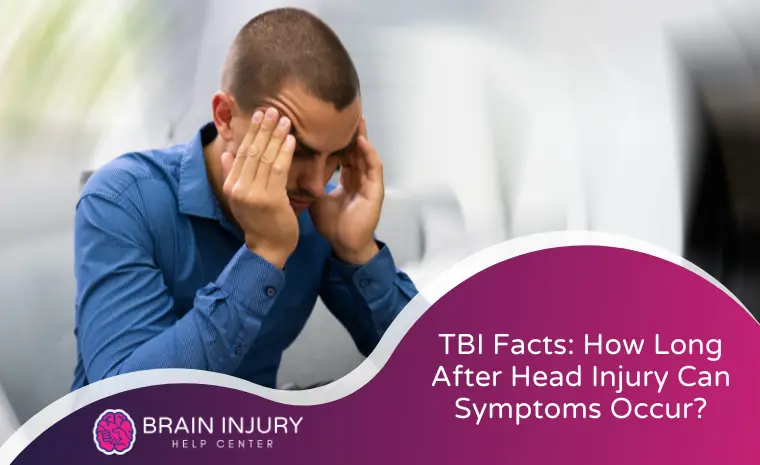How long after head injury can symptoms occur? Whether resulting from car accidents, falls, sports injuries, or other incidents, the consequences of a traumatic brain injury (TBI) can be life-altering. As a victim or family member navigating the aftermath of such an injury, understanding the timelines associated with symptom onset is crucial.
Timely intervention can make a substantial difference in both recovery outcomes and the success of legal claims. In this article, we delve into the facts surrounding a brain injury accident, empowering you with the knowledge necessary to navigate the complexities of TBI claims in California.
Understanding TBI
Traumatic brain injuries encompass a spectrum of injuries to the head that disrupt normal brain function. Here’s a concise overview of what constitutes a traumatic brain injury and how long after a brain injury accident can symptoms occur:
What is TBI?
- TBIs occur when a sudden blow, jolt, or penetrating injury to the head disrupts the normal function of the brain.
- They can result from various incidents, including falls, vehicle collisions, sports injuries, assaults, and workplace accidents.
Common Causes of TBI
- Slip and Falls: Falls are the leading cause of TBIs, particularly among the elderly and young children.
- Motor Vehicle Accidents: Car, motorcycle, bicycle, and pedestrian accidents frequently result in TBIs due to the force of impact.
- Sports Injuries: Contact sports like football, soccer, and hockey pose a risk of traumatic brain injury due to collisions or falls.
- Violent Assaults: Intentional blows to the head during altercations cause severe TBIs.
- Workplace Accidents: Industrial accidents, construction mishaps, and falls from heights can lead to TBIs in the workplace.
How Long After Head Injury Can Symptoms Occur?
Following a brain injury accident, symptoms of TBI can manifest immediately or take days, weeks, or even months to become apparent. It’s crucial to understand the various timelines associated with TBI symptoms and non-economic damages to ensure timely medical attention and proper legal action if necessary.
Immediate Symptoms
Some symptoms of TBI may become evident immediately following a head injury. These can include:
- Loss of consciousness
- Confusion or disorientation
- Headaches
- Nausea or vomiting
- Dizziness or loss of balance
- Double vision, blurry vision, or ringing in the ears
- Sensory disturbances, such as numbness or tingling
These immediate symptoms often prompt individuals to seek medical attention promptly. However, it’s essential to recognize that not all TBIs present with immediate symptoms when answering the question “How long after head injury can symptoms occur”.
Delayed Symptoms
In some cases, physical symptoms of concussion or TBI may not become apparent until a period after the initial injury. These delayed symptoms can include:
- Persistent or worsening headaches
- Difficulty concentrating or remembering
- Mood changes, such as irritability or depression
- Sleep disturbances
- Loss of memory
- Sensory sensitivities, such as increased sensitivity to light or sound
- Cognitive difficulties, such as difficulty organizing thoughts or making decisions
This delayed or post-concussion syndrome can significantly impact an individual’s daily life and may require ongoing medical care and rehabilitation. Additionally, they can play a crucial role in legal claims, highlighting the importance of monitoring traumatic brain injuries and concussion symptoms closely following a head injury.

The Importance of Medical Assessment
A doctor is critical to answering “H long after head injury can symptoms occur”. Medical professionals conduct comprehensive assessments of this type of injury, including neurological exams, imaging tests such as CT scans or MRIs, and cognitive evaluations, to accurately diagnose TBIs and determine their severity. Early diagnosis allows for appropriate medical interventions, such as medication, rehabilitation therapies, or surgical procedures, which can improve outcomes and mitigate long-term complications.
Moreover, medical documentation serves as critical evidence in legal proceedings, providing a clear record of the injury’s effects on the victim’s mental function and quality of life. This documentation strengthens the foundation of traumatic brain injury claims, supporting the pursuit of compensation for medical expenses, lost income, pain and suffering, and other damages.
Navigating TBI Claims in California
Filing a severe injury claim in California involves navigating complex legal considerations. Understanding the statute of limitations is crucial, as there is a limited window of time within which a claim must be filed. In California, the statute of limitations for personal injury claims, including those related to TBIs, is generally two years from the date of the injury.
Seeking the assistance of a specialized legal expert or attorney experienced in handling TBI claims can significantly benefit victims and their families. A knowledgeable attorney can navigate the intricacies of these claims, including gathering necessary evidence, negotiating with insurance companies, and advocating for just compensation.
Conclusion
So, how long after head injury can symptoms occur? Understanding the timeline for the common symptoms of TBI and taking swift legal and medical action following a brain injury accident is paramount for ensuring optimal outcomes. Prompt medical attention can lead to accurate diagnosis and timely treatment, while thorough documentation supports legal compensation claims.
For further resources and support related to TBI and legal assistance in California, visit the Brain Injury Help Center website. We offer free consultation. You’re not alone in this journey – reach out for the help and support you deserve.









